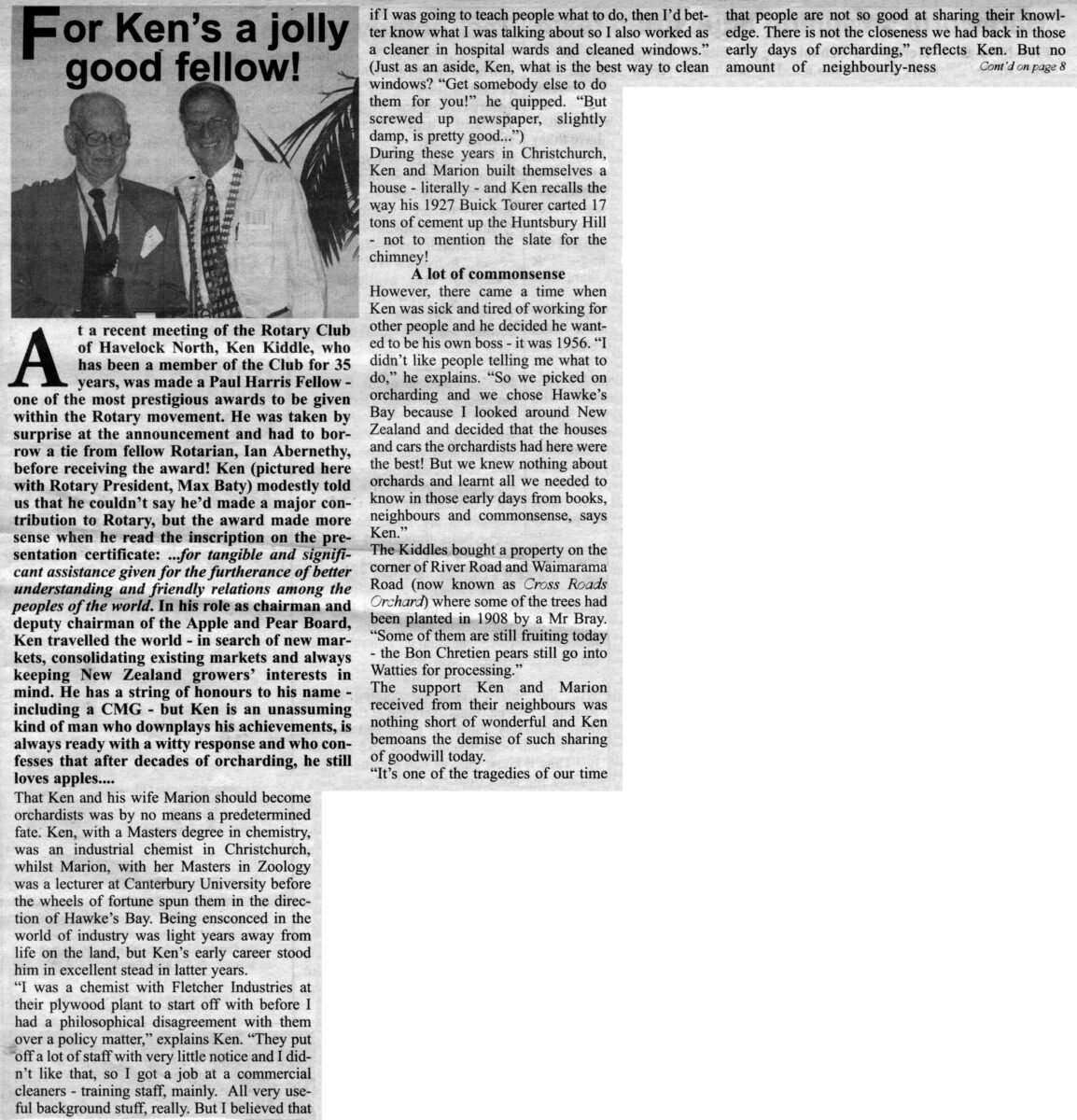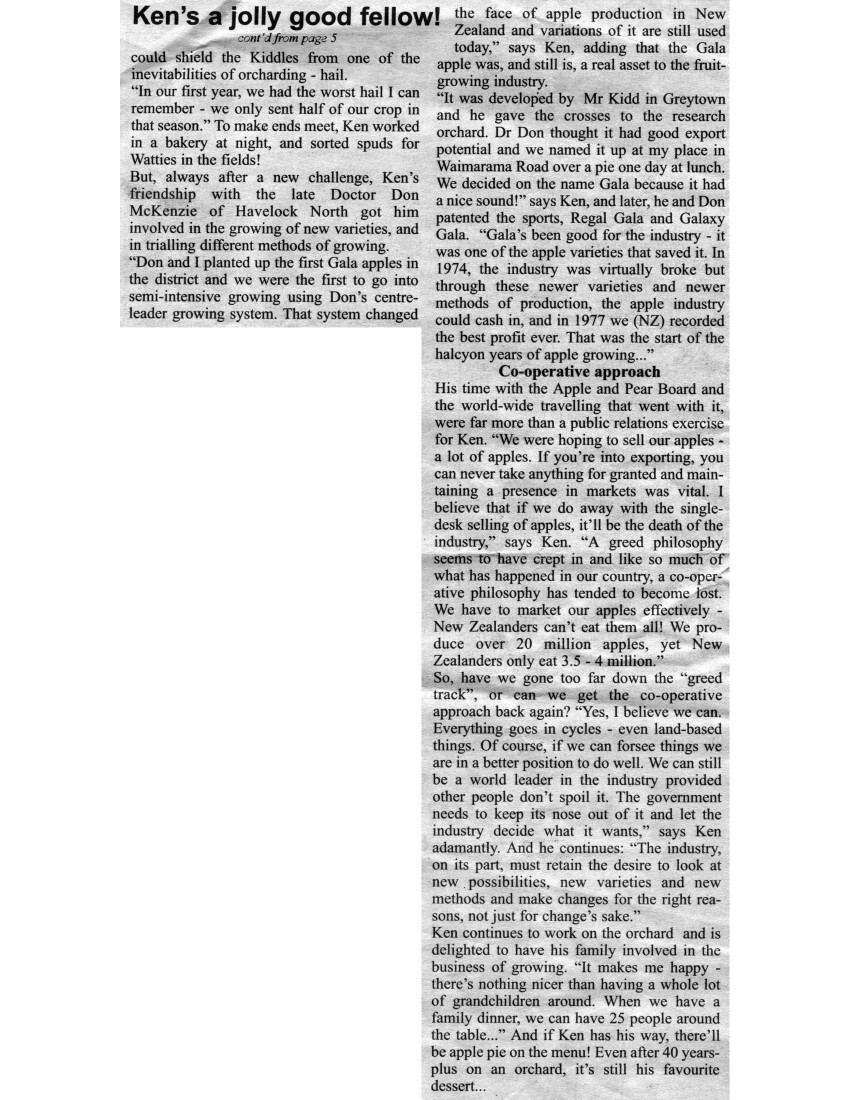For Ken’s a jolly good fellow!
At a recent meeting of the Rotary Club of Havelock North, Ken Kiddle, who has been a member of the Club for 35 years, was made a Paul Harris Fellow – one of the most prestigious awards to be given within the Rotary movement. He was taken by surprise at the announcement and had to borrow a tie from fellow Rotarian, Ian Abernethy, before receiving the award! Ken (pictured here with Rotary President, Max Baty) modestly told us that he couldn’t say he’d made a major contribution to Rotary, but the award made more sense when he read the inscription on the presentation certificate: … for tangible and significant assistance given for the furtherance of better understanding and friendly relations among the peoples of the world. In his role as chairman and deputy chairman of the Apple and Pear Board, Ken travelled the world – in search of new markets, consolidating existing markets and always keeping New Zealand growers’ interests in mind. He has a string of honours to his name – including a CMG – but Ken is an unassuming kind of man who downplays his achievements, is always ready with a witty response and who confesses that after decades of orcharding, he still loves apples …
That Ken and his wife Marion should become orchardists was by no means a predetermined fate. Ken, with a Masters degree in chemistry, was an industrial chemist in Christchurch, whilst Marion, with her Masters in Zoology was a lecturer at Canterbury University before the wheels of fortune spun them in the direction of Hawke’s Bay. Being ensconced in the world of industry was light years away from life on the land, but Ken’s early career stood him in excellent stead in latter years.
“I was a chemist with Fletcher Industries at their plywood plant to start off with before I had a philosophical disagreement with them over a policy matter,” explains Ken. “They put off a lot of staff with very little notice and I didn’t like that, so I got a job at a commercial cleaners -training staff, mainly. All very useful background stuff, really. But I believed that if I was going to teach people what to do, then I’d better know what I was talking about so I also worked as a cleaner in hospital wards and cleaned windows.”
(Just as an aside, Ken, what is the best way to clean windows? “Get somebody else to do them for you!” he quipped. “But screwed up newspaper, slightly damp, is pretty good …”)
During these years in Christchurch, Ken and Marion built themselves a house – literally – and Ken recalls the way his 1927 Buick Tourer carted 17 tons of cement up the Huntsbury Hill – not to mention the slate for the chimney!
A lot of commonsense
However, there came a time when Ken was sick and tired of working for other people and he decided he wanted to be his own boss – it was 1956. “I didn’t like people telling me what to do,” he explains. “So we picked on orcharding and we chose Hawke’s Bay because I looked around New Zealand and decided that the houses and cars the orchardists had here were the best! But we knew nothing about orchards and learnt all we needed to know in those early days from books, neighbours and commonsense, says Ken.”
The Kiddles bought a property on the corner of River Road and Waimarama Road (now known as Cross Roads Orchard) where some of the trees had been planted in 1908 by a Mr Bray. “Some of them are still fruiting today – the Bon Chretien pears still go into Watties for processing.”
The support Ken and Marion received from their neighbours was nothing short of wonderful and Ken bemoans the demise of such sharing of goodwill today.
“It’s one of the tragedies of our time that people are not so good at sharing their knowledge. There is not the closeness we had back in those early days of orcharding,” reflects Ken. But no amount of neighbourly-ness Cont’d on page 8













Do you know something about this record?
Please note we cannot verify the accuracy of any information posted by the community.